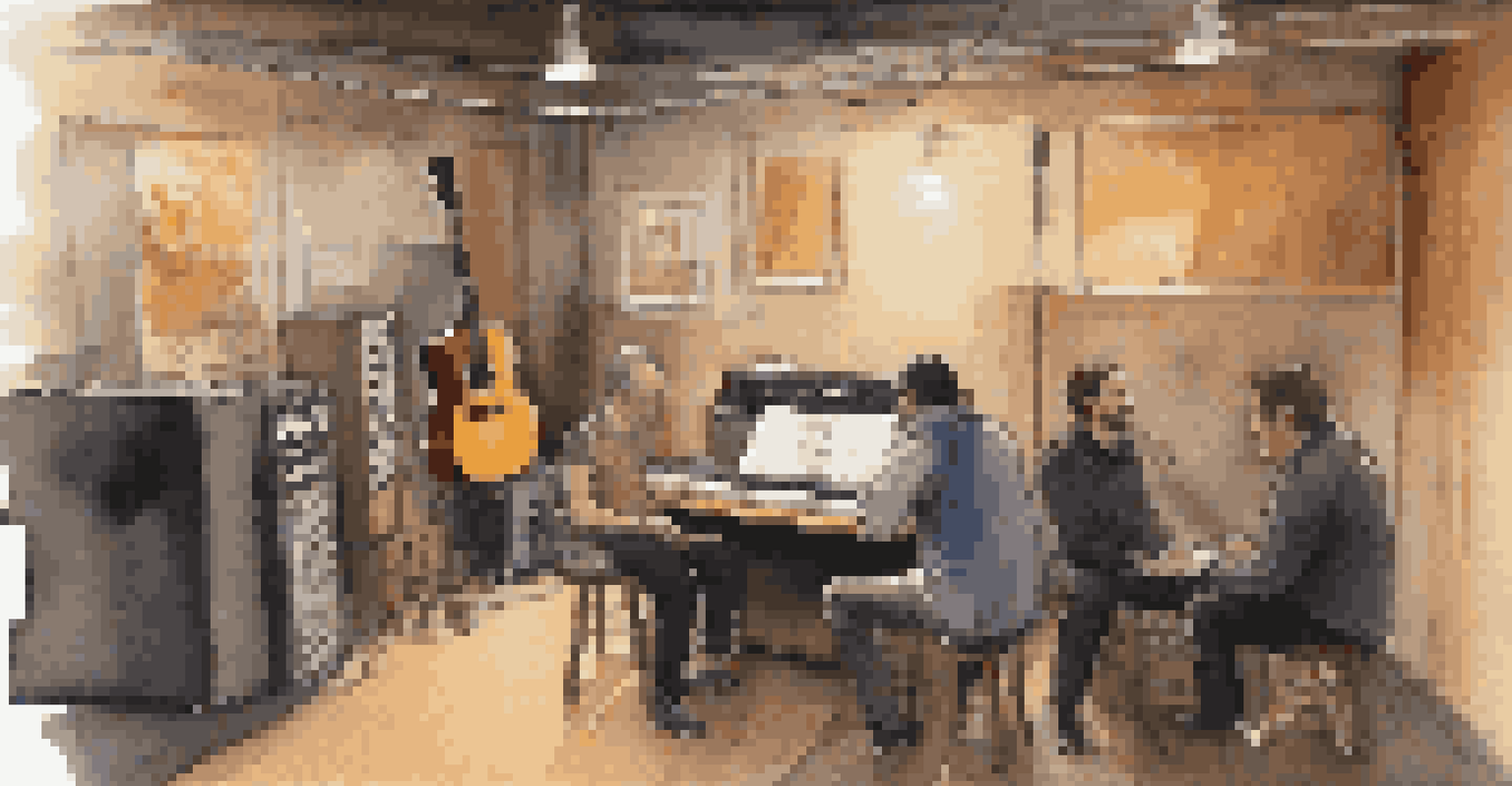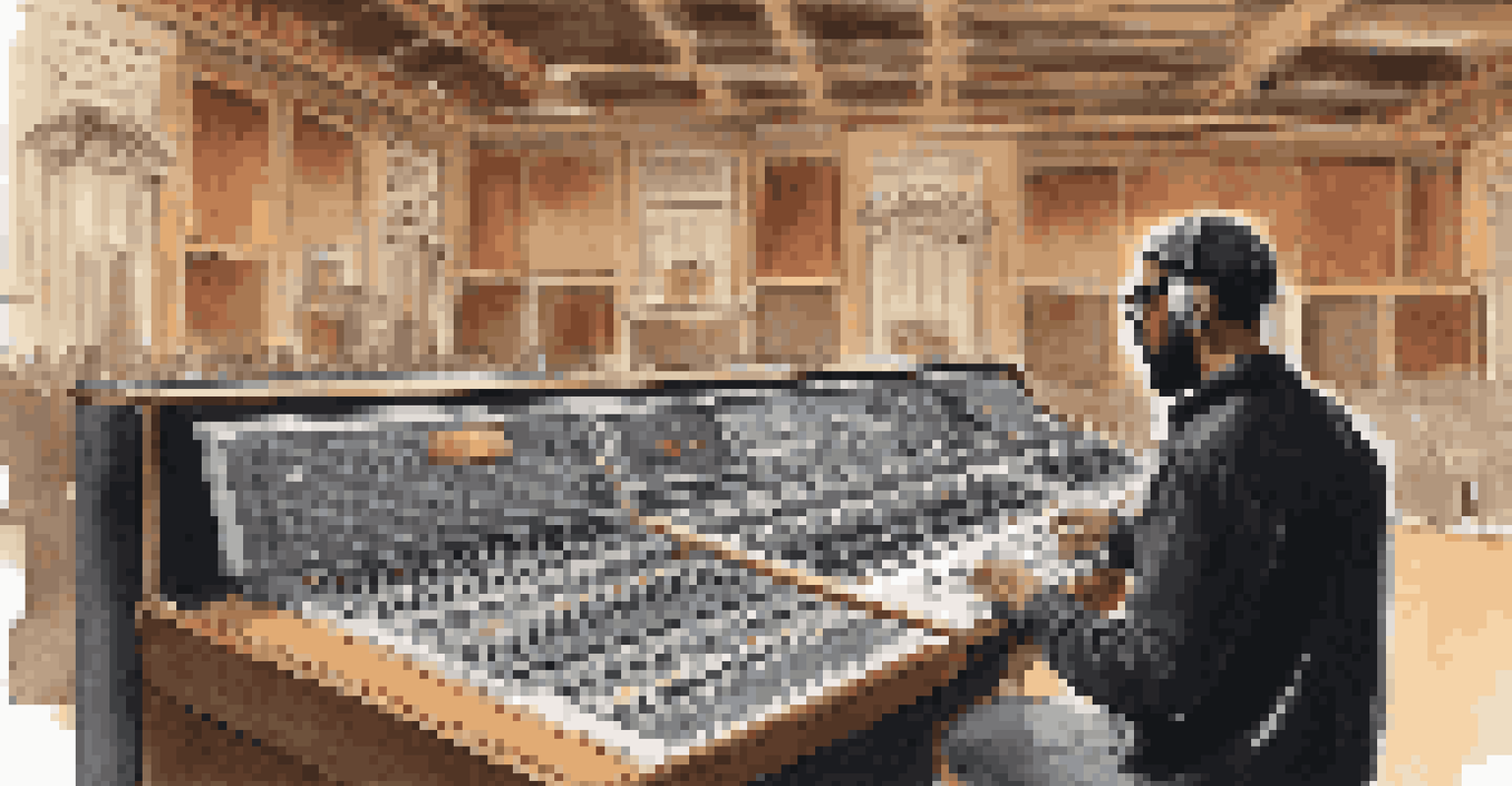Live Sound Engineering: Collaborating with Musicians

Understanding the Role of a Live Sound Engineer
Live sound engineers play a crucial role in ensuring that music sounds its best during performances. They are responsible for managing sound equipment, mixing audio, and creating a balance that enhances the overall experience for the audience. Their expertise goes beyond just technical skills; they must understand the music and the musicians' vision to bring it to life.
Sound is the universal language of mankind.
This role requires a deep understanding of acoustics, sound systems, and the nuances of different instruments. A great sound engineer knows how to adjust settings on the fly, responding to the unique venue and the dynamics of each performance. By mastering these elements, they help create an unforgettable auditory experience that complements the musicians' artistry.
In essence, a live sound engineer is like a conductor in an orchestra, ensuring that every note is perfectly timed and harmonized. Their collaboration with musicians is vital, as it takes both parties working together to achieve the desired sound. This partnership is built on communication, trust, and a shared passion for music.
The Importance of Pre-Show Collaborations
Before the concert begins, pre-show meetings between sound engineers and musicians can set the stage for a successful performance. These discussions often cover everything from sound preferences to specific effects that the musicians want to incorporate. By having these conversations early on, everyone involved can be aligned on the vision for the show.

During these meetings, sound engineers can learn about the musicians' individual styles and any unique requirements they may have. For instance, a guitarist may prefer a certain type of distortion, while a vocalist might need specific microphone settings. Understanding these preferences allows the engineer to prepare and create a tailored sound environment that enhances the performance.
Collaboration Sets the Stage
Pre-show meetings between sound engineers and musicians align their vision for a successful performance.
This initial collaboration builds rapport and trust, which is essential for a smooth show. When musicians feel heard and understood, they can focus on their performance without worrying about the sound quality. Ultimately, this teamwork helps to create a seamless connection between the artist and their audience.
Effective Communication During Performances
Effective communication during a live show is crucial for sound engineers and musicians. Whether it's through hand signals, in-ear monitors, or simply eye contact, conveying messages quickly can make all the difference. For instance, if a musician feels that their vocals are too low, a subtle gesture can prompt the engineer to make immediate adjustments.
Music can change the world because it can change people.
Moreover, sound engineers often need to communicate with the band about changes in the setlist or unexpected issues that arise. Having a system in place for quick communication ensures that everyone is on the same page. This dynamic interaction allows for real-time adjustments, which can elevate the performance to new heights.
At the end of the day, effective communication is about building a strong relationship. When musicians trust their sound engineer to understand their needs and respond promptly, it fosters a collaborative environment where creativity can flourish. This synergy enhances the overall experience for both the performers and the audience.
Adapting to Unique Venue Acoustics
Every venue presents its own set of acoustic challenges, and a skilled sound engineer must adapt to these conditions. Factors such as room size, shape, and materials can significantly impact sound quality. A sound engineer needs to be like a chameleon, adjusting their techniques to fit the unique characteristics of each location.
For example, a large outdoor venue may require different equipment and techniques compared to a small, intimate club. Sound engineers must also consider how the placement of speakers and monitors affects the overall sound. By conducting thorough sound checks and experimenting with settings, they can find the sweet spot that ensures optimal audio for everyone in attendance.
Adaptability is Key in Venues
Sound engineers must adjust techniques to accommodate the unique acoustic challenges of each venue.
This adaptability is crucial, as the goal is always to deliver the best sound possible, regardless of the venue. By working closely with musicians and understanding their needs, sound engineers can create a balanced mix that resonates well in any environment. This skill not only showcases their expertise but also enhances the performers' connection with the audience.
Utilizing Technology for Enhanced Collaboration
In today's world, technology plays a significant role in live sound engineering. From digital mixing consoles to advanced audio processing tools, these innovations can greatly enhance the collaboration between engineers and musicians. Understanding and utilizing these technologies allows for more precise sound adjustments and creative possibilities.
For instance, many sound engineers now use software that enables real-time monitoring of sound levels and frequencies. This capability allows for quick adjustments during performances, ensuring that every note is delivered with clarity. Additionally, musicians can use in-ear monitors to hear themselves better, which enhances their performance and overall confidence on stage.
By embracing technology, sound engineers can create an environment that supports artistic expression. This collaboration often leads to unique soundscapes that can elevate a performance to something truly special. Ultimately, the integration of technology fosters a creative partnership that benefits everyone involved.
Post-Show Feedback and Continuous Improvement
After a performance, gathering feedback is essential for both sound engineers and musicians. Discussing what worked well and what could be improved helps refine their collaboration for future shows. This practice not only enhances the quality of sound but also strengthens the relationship between the performers and the engineer.
Musicians often have valuable insights regarding how their sound translated to the audience. A sound engineer can take this feedback and adjust their techniques for the next performance, ensuring a continuous cycle of improvement. This iterative process fosters growth and encourages both parties to experiment with new ideas.
Trust Enhances Performance Quality
Building trust through consistent collaboration allows musicians and sound engineers to experiment and elevate their performances.
Moreover, post-show discussions can deepen the understanding between musicians and engineers. When both sides are open to constructive criticism and eager to learn, it enriches the creative process. This commitment to improvement ultimately results in a more polished and impactful performance.
Building Trust Through Consistent Collaboration
Trust is the foundation of any successful collaboration, and this is especially true in live sound engineering. When musicians work with the same sound engineer over time, they build a rapport that allows for greater creative freedom. This level of trust encourages open communication and a willingness to experiment with new sounds.
A sound engineer who understands a musician's style can make informed decisions that align with their artistic vision. For example, they may know when to enhance a particular instrument or when to step back and let the music shine. This intuitive understanding leads to a more cohesive performance that resonates with the audience.

Ultimately, building trust takes time, but the rewards are worth it. As musicians and sound engineers continue to collaborate, they create a partnership that elevates their work and enhances the overall concert experience. This synergy is what makes live performances truly remarkable.